Featured
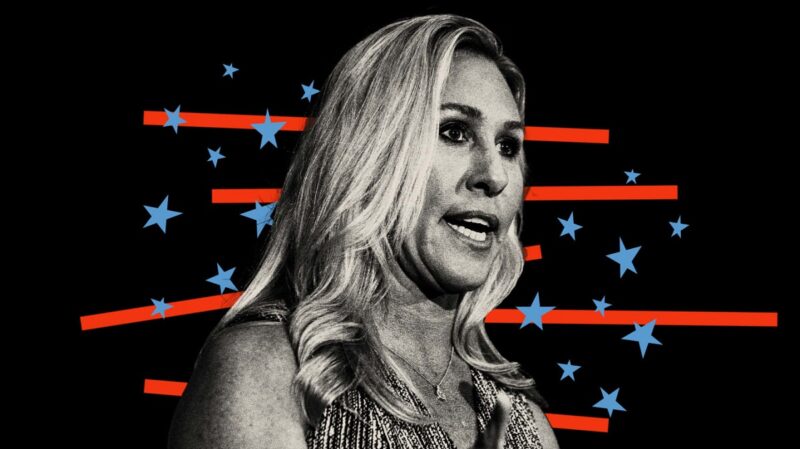 National Divorce Is More Popular Than You Think. By Bonnie Kristan / The Daily Beast
National Divorce Is More Popular Than You Think. By Bonnie Kristan / The Daily Beast
Rep. Marjorie Taylor Greene’s call for breaking up the U.S. outraged many, but the idea is fairly mainstream and bipartisan. It’s also totally unrealistic.
The critiques are an exercise in missing not one but several points: that this isn’t novel territory for Greene or her base, that national divorce is a popular idea across the American political spectrum (including among progressive Democrats), and that it’s popular for pretty good reason. In the grand scheme of stuff that comes out of Greene’s mouth—QAnon conspiracism, space lasers, bad Holocaust analogies—national divorce proposals are well on the normal and sensible side. A national split (or, if you prefer, secession) is a hot topic on the populist right. Two thirds of Southern Republicans are ready for regional secession, one 2021 survey found. Another, later that year, had 52 percent of voters for former President Donald Trump ready for red or blue states to depart and “form their own separate country.” Read more
Related: Marjorie Taylor Greene’s Civil War. By Peter Wehner / The Atlantic
Political / Social
 Republicans use ‘wokeism’ to attack left — but struggle to define it. By Ashley Parker and Liz Goodwin / Wash Post
Republicans use ‘wokeism’ to attack left — but struggle to define it. By Ashley Parker and Liz Goodwin / Wash Post
Republican politicians and voters alike have differing definitions of wokeism — and some struggle to define it at all. The rallying cry has recently been used to denounce everything from climate change policies and socially responsible investing to transgender rights, critical race theory and the Black Lives Matter movement.
Much like the “cancel” of “cancel culture,” “woke” is another word that originated in Black culture before being co-opted by White people. Some credit blues singer Huddie “Lead Belly” Ledbetter for helping to popularize the term in his 1938 protest song, “The Scottsboro Boys,” in which he urges Black America to “stay woke” to social and political injustice as well as physical violence. Read more
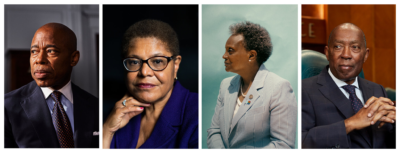 Black Mayors of 4 Biggest U.S. Cities Draw Strength From One Another. Emma G. Fitzsimmons and
Black Mayors of 4 Biggest U.S. Cities Draw Strength From One Another. Emma G. Fitzsimmons and
From left to right, Mayor Eric Adams of New York; Mayor Karen Bass of Los Angeles; Mayor Lori Lightfoot of Chicago; and Mayor Sylvester Turner of Houston.Credit…From left: An Rong Xu for The New York Times, Erin Schaff/The New York Times, Akilah Townsend for The New York Times, Michael Starghill Jr. for The New York Times
The Democratic mayors — Ms. Bass, Ms. Lightfoot, Eric Adams of New York City and Sylvester Turner of Houston — say their shared experiences and working-class roots as Black Americans give them a different perspective on leading their cities than most of their predecessors. In interviews, the four mayors discussed how their backgrounds helped shape their successful campaigns, and how they provide a unique prism to view their cities’ problems. Read more
 The State of Black Tampa Bay: An Exclusive Town Hall. By Deanne King / Newsbreak
The State of Black Tampa Bay: An Exclusive Town Hall. By Deanne King / Newsbreak
Editor’s Note: Although this thoughtful and intelligent discussion of the teaching of Black history, housing affordability, and police accountability are addressed in a local context, the issues and answers are replicated nationally.
News Channel 8’s Deanne King brought together community leaders, government officials and people in the community to discuss topics like learning Black history in schools, the mistrust between law enforcement and the Black community, the racial wealth gap and more. Watch here
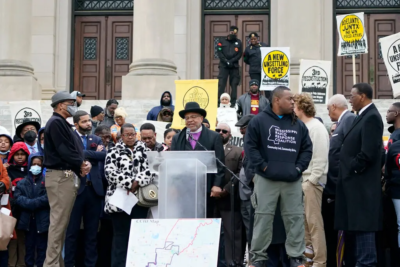 In Mississippi’s Capital, Old Racial Divides Take New Forms. By Michael Wines / NYT
In Mississippi’s Capital, Old Racial Divides Take New Forms. By Michael Wines / NYT
A plan by Republican lawmakers to set up a new court system served by a state-run police force for parts of mainly Black Jackson has become a flash point for racial and political divisions. Over 200 people gathered on the steps of the Mississippi Capitol to voice their opposition to a plan to change policing and courts in Jackson.Credit…Rogelio V. Solis/Associated Press
Legislators approved a bill that would establish a separate court system for roughly one-fifth of Jackson, run by state-appointed judges and served by the state-run police force that currently patrols the area around Mississippi government buildings. For the neighborhoods it would cover, the entire apparatus would effectively supplant the existing Hinds County Circuit Court, whose four judges are elected, and the city-run Jackson Police Department. Read more
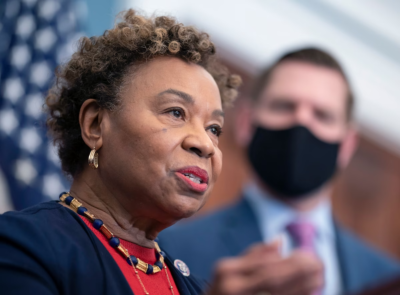 Rep. Barbara Lee launches U.S. Senate run in California. By Maeve Reston / Wash Post
Rep. Barbara Lee launches U.S. Senate run in California. By Maeve Reston / Wash Post
As she enters one of 2024′s most closely watched races, Lee has underscored the importance of electing a Black woman to the Senate
Democratic Rep. Barbara Lee launched her bid to become California’s next U.S. senator on Tuesday, touting her history as an unwavering champion of liberal causes as she underscored the importance of electing a Black female senator to a chamber that has had none since Kamala D. Harris resigned in 2021 to become vice president. Lee is the third U.S. House member to enter the unpredictable race to replace retiring Sen. Dianne Feinstein, who has held the seat for three decades. Read more
 Did Politics Scrub ‘systemic’ from AP African American Studies Plan. By Nick Anderson / Wash Post
Did Politics Scrub ‘systemic’ from AP African American Studies Plan. By Nick Anderson / Wash Post
Writing and editing the Advanced Placement course framework was a tense exercise in a polarized America
A politically charged adjective popped up repeatedly in the evolving plans for a new Advanced Placement course on African American studies. It was “systemic.” The February 2022 version declared that students should learn how African American communities combat effects of “systemic marginalization.” An April update paired “systemic” with discrimination, oppression, inequality, disempowerment and racism. A December version said it was essential to know links between Black Panther activism and “systemic inequality that disproportionately affected African Americans.” Then the word vanished. “Systemic,” a crucial term for many scholars and civil rights advocates, appears nowhere in the official version released Feb. 1. Read more
 The racist idea that changed American education. By Matt Barnum / Vox
The racist idea that changed American education. By Matt Barnum / Vox
How a landmark Supreme Court decision was shaped by the racist idea that poor children can’t learn.
Almost exactly 50 years ago, Alex Rodriguez got his 15 minutes of fame when he was in sixth grade. In 1968, his father, Demetrio, had sued the state of Texas for underfunding his son’s school district, which was predominantly made up of low-income and Mexican American families. Alex recalls the third floor of his elementary school being condemned; when it rained, water would pour down the stairs. Three or four students shared one textbook. Fifty years ago this year, the Supreme Court cited some of that same research to rule against the Rodriguez family. The racist notion that children in poverty could not benefit from additional or even equal resources may well have influenced the court’s decision. Read more
 At VMI, two classmates — one Black, one White — war over school’s future. By Ian Shapira / Wash Post
At VMI, two classmates — one Black, one White — war over school’s future. By Ian Shapira / Wash Post
Retired Maj. Gen. Cedric T. Wins, center, Virginia Military Institute’s first Black superintendent, walks with cadets Ethan Miles, left, and Reece Demory after speaking to potential students and families during an open house event. (Justin Ide)
One enthusiastic fan: Matt Daniel, his “brother rat,” as VMI classmates call one another, who’d graduated the same year as Wins in 1985. However, months into the new superintendent’s tenure, Daniel, now 60, and other 1985 graduates launched a political action committee called the Spirit of VMI. The group has been pushing back forcefully against Wins, 59, and his diversity, equity and inclusion initiatives, which are intended to attract more minorities and women to campus and make them feel valued and respected as cadets. “Reject the woke assault on VMI,” one of the PAC’s websites blares in all-caps. “Close ranks.” Read more
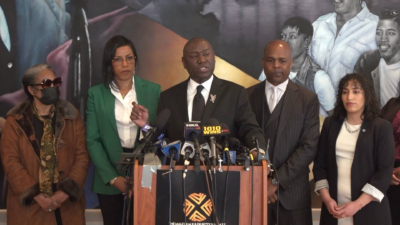 Who Killed Malcolm X? Family to File $100M Suit v. FBI, CIA, NYPD & Others to Find the Truth. By Amy Goodman / Democracy Now
Who Killed Malcolm X? Family to File $100M Suit v. FBI, CIA, NYPD & Others to Find the Truth. By Amy Goodman / Democracy Now
On the 58th anniversary of Malcolm X’s assassination, civil rights lawyer Benjamin Crump announced a new lawsuit from Malcolm X’s surviving family seeking compensation from the NYPD, CIA and FBI for its role in concealing evidence in his murder case.
The family of Malcolm X has announced plans to file a $100 million wrongful death lawsuit against the FBI, the CIA, New York City and the state, the NYPD and New York District Attorney’s Office for concealing evidence of their involvement of Malcolm X’s assassination. The family’s announcement came on Tuesday, the 58th anniversary of Malcolm’s assassination, February 21st, 1965. On Tuesday, Malcolm X’s daughter Dr. Ilyasah Shabazz and civil rights attorney Ben Crump, standing at the site of the assassination February 21st, 1965, in the Audubon Ballroom in Harlem, held a news conference. They spoke about Malcolm X and Dr. Betty Shabazz at the memorial and educational center in their name. Watch here
 These 12 Asian Americans Wonder When the Stereotypes Will Fade. By NYT staff
These 12 Asian Americans Wonder When the Stereotypes Will Fade. By NYT staff
We asked our participants questions about identity: how they see themselves and how they think other Americans see Asian Americans. It was one of our liveliest conversations from the get-go, with some participants expressing mixed feelings about the term “Asian American” itself, as well as about their feelings about assimilation, dating and how they are viewed at work. Read more
Ethics / Morality / Religion
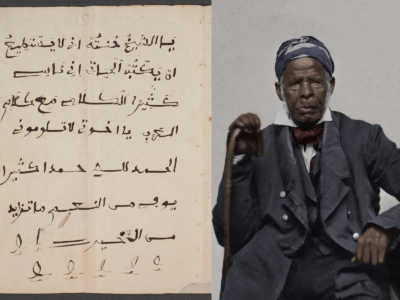 New research reconsiders writings of a Muslim slave and scholar. By Yonat Shimron / RNS
New research reconsiders writings of a Muslim slave and scholar. By Yonat Shimron / RNS
A page of Omar ibn Said’s autobiography, written in Arabic in 1831, and a restored, colorized portrait of Omar ibn Said, right, around the 1850s. Page courtesy of LOC; Photo courtesy of Yale University Library
He was a slave from Senegal who wrote in Arabic. Or was he an Arab prince? He was a scholar who memorized vast passages of the Quran and mastered numerous Islamic texts. Or were his writings unintelligible? He was a devout Muslim. Or did he convert to Christianity? These are just some of the conflicting narratives about Omar ibn Said (or more correctly Sayyid), a black Muslim scholar captured in Senegal in 1807 and transported by boat to Charleston, South Carolina. He eventually fled to North Carolina and lived out his days as a house slave to James Owen and Owen’s brother, onetime North Carolina Governor John Owen. Read more
 Nikki Haley says she’s Christian, but it’s complicated. By Khyati Y. Joshi / RNS
Nikki Haley says she’s Christian, but it’s complicated. By Khyati Y. Joshi / RNS
Growing up Indian American in the 20th-century South was dissonant not only racially but even more so in terms of religion. Haley grew up Sikh, and I grew up Hindu, in a place where both the landscape and the culture were dominated by evangelical Christian megachurches.
Religion, and her conversion to Christianity, has made Haley suspect in the eyes of both Christians and non-Christians. The first time she ran for the South Carolina Legislature, she identified both with her parents’ Sikh religion and with the Methodist faith of her husband. As she grew in political stature, however, her campaign faced more and more questions that sounded something like this: “OK, she’s talking about God, but which God?” Read more
 Three Black Women Who Preached With the Power of the Holy Spirit. By Kate Hanch / Christianity Today
Three Black Women Who Preached With the Power of the Holy Spirit. By Kate Hanch / Christianity Today
What Zilpha Elaw, Julia Foote, and Sojourner Truth taught me about God’s “withness.”
A Methodist woman in Albany, New York, didn’t want to go hear Zilpha Elaw preach. For one thing, Elaw was a woman, and that seemed “unbecoming.” To make matters worse, Elaw was Black, and that violated a sense of propriety and decorum. She didn’t want to go. But her husband persuaded her, and when she heard Elaw preach, she was convicted by the power of the Holy Spirit. Read more
 The Decolonization of Christianity Is Not Complete. By Tish Harrison Warren / NYT
The Decolonization of Christianity Is Not Complete. By Tish Harrison Warren / NYT
For Black History Month, I’m profiling individuals who work in religious arenas for reparations to Black Americans. Last week, I featured Gregory Thompson, a former pastor and the founder of Voices Underground, a nonprofit creative firm that helps communities recover, interpret and honor their African American histories. This week, we hear from Ekemini Uwan, a co-author of the book “Truth’s Table: Black Women’s Musings on Life, Love, and Liberation ” and co-host of the “Truth’s Table” podcast. Read more
Historical / Cultural
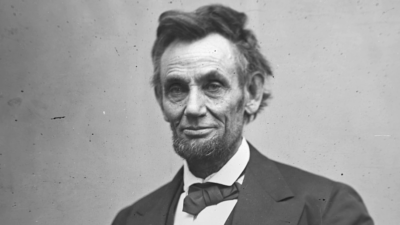 Abraham Lincoln’s disastrous effort to get Black people to leave the U.S. By Sydney Trent / Wash Post
Abraham Lincoln’s disastrous effort to get Black people to leave the U.S. By Sydney Trent / Wash Post
A day before issuing the Emancipation Proclamation, Lincoln signed a contract to send hundreds of formerly enslaved people to Haiti
The Île-à-Vache project, along with other colonization plans that never came to fruition in Central and South America and the European West Indies, complicate the enduring image of Lincoln as the Great Emancipator, savior of African Americans and one of the most widely admired presidents in U.S. history. Many prominent U.S. historians have argued that Lincoln’s public support for colonization was primarily designed to placate racist White voters opposed to emancipation or that the period after the Emancipation Proclamation represented a turning point in his thinking as African Americans began to fight and die for the country. Read more
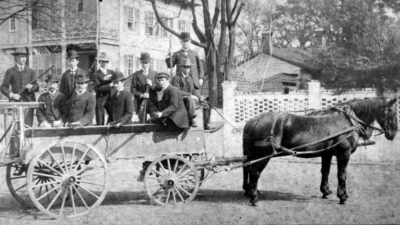 ‘The wound hasn’t healed’: Activists recount 1898 Wilmington coup that terrorized Black residents. By Sara Avery / ABC News
‘The wound hasn’t healed’: Activists recount 1898 Wilmington coup that terrorized Black residents. By Sara Avery / ABC News
The campaign claimed hundreds of Black lives as thousands more fled the city.
Athalia Howe was just 12 years old when she, her sister and mother were forced to seek refuge in a cemetery as armed white supremacists terrorized Wilmington, North Carolina, in the fall of 1898. Separated from her father, they were unsure if he was still alive until days later when they reunited. Nearly 125 years later, the wounds of the deadly campaign still run deep in the city, with many residents saying Wilmington never made amends for the tragedy. Residents and activists continue to work toward uncovering that history and finding redress for the descendants of Black residents impacted by the violence. Read more
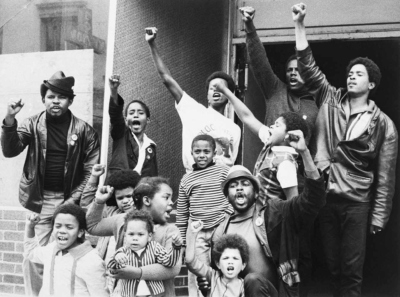 Why the United States Needs a New Reconstruction. By Robert Greene II / The Nation
Why the United States Needs a New Reconstruction. By Robert Greene II / The Nation
Peniel Joseph’s history of the three Reconstructions. The Black Panthers’ Liberation School, San Francisco, 1969. (UPI / Getty)
In Peniel Joseph’s new book, The Third Reconstruction: America’s Struggle for Racial Justice in the Twenty-First Century he turns his attention to Black America’s plight since the beginning of the 1980s. For Joseph, not to mention many others, the need to reckon with the history of the last 40 years is paramount if we are to finally complete the work of Reconstruction. Inspired by the events of Barack Obama’s presidency, the rise of Black Lives Matter in the 2010s, the crises of Covid and the January 6 insurrection, and his own early life experiences, Joseph offers a book that seeks to understand the post–civil rights history of Black America. Read more
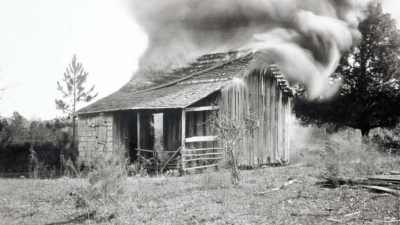 Legalize Black History. By Jesse Hagopian / The Progressive
Legalize Black History. By Jesse Hagopian / The Progressive
Florida’s past is replete with lessons for building an anti-racist future. We can’t allow them to be purged from our classrooms. Shown is the burning of a Black resident’s home in Rosewood, Florida, part of the Rosewood Massacre of 1923 that destroyed the whole community.
This debate over teaching Black history comes in the context of forty-two states that have introduced legislation or enacted policies that require teachers to deceive students about race, gender, and sexuality. Many of the bills prohibit teaching that the “United States is fundamentally racist or sexist” or ban any teaching that could make students “feel discomfort” when discussing racism or sexism. Eighteen states have imposed these anti-history gag laws, and they aren’t confined to just the South or to “red” states. No one’s history should be illegal, and if Black history is any guide, a great resistance to this injustice will rise in Florida and around the country. Read more
 A look into the history of the Black men who built the US Capitol, Tidal Basin and beyond. By Carl Willis / News 4
A look into the history of the Black men who built the US Capitol, Tidal Basin and beyond. By Carl Willis / News 4
Many D.C. natives and visitors to the National Mall have heard the stories behind the buildings and the monuments, but the Black history has not always been
Jesse J. Holland, a journalist and author of “Black Men Built the Capitol” wants visitors to know Black history is all around and through the U.S. Capitol. Especially here on the National Mall,” Holland said. “There’s so much African-American history that isn’t talked about. It’s time to start talking about the real history of the National Mall and Washington, D.C.” Standing on the stretch of land between the U.S. Capitol and the Washington Monument, Holland paints a picture of the slave markets that used to occupy those grounds. He also evokes the slave labor that was used to build the Capitol building, itself, at a time when skilled labor was hard to find and deemed too expensive to import. Read more
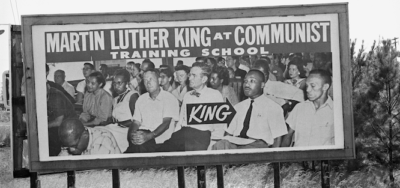 The South Has Got Something To Say. By Jared Anthony Loggins / Dissent Magazine
The South Has Got Something To Say. By Jared Anthony Loggins / Dissent Magazine
In recent books, Adolph L. Reed Jr. and Imani Perry offer divergent explanations of Southern inequality. A photograph taken by civil rights marchers on the way from Selma to Montgomery, Alabama, of a billboard depicting Martin Luther King Jr. at the Highlander Folk School (Getty Images)
Black inhabitants of the South did not respond uniformly to the rules and folkways of Jim Crow, nor do they see its demise in quite the same way. Two recent books use the authority of testimony to demonstrate this plurality. Adolph L. Reed Jr.’s The South and Imani Perry’s South to America are both outstanding contributions to an ongoing debate about how to evaluate Southern culture, identity, and politics. Read more
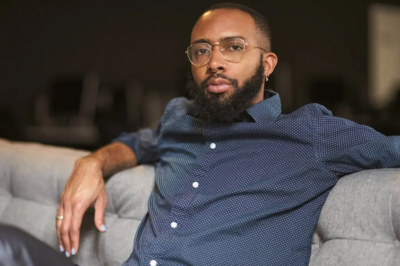 An Extraordinary Memoir of a Black American Boyhood. By Bryan Washington / NYT
An Extraordinary Memoir of a Black American Boyhood. By Bryan Washington / NYT
Joseph Earl Thomas’s remarkable debut, “Sink,” recounts the coming-of-age of a young man for whom poverty, violence, drug abuse and racism were simply facts of daily life.
Set in Philadelphia, largely in the late 1990s, “Sink” chronicles Thomas’s journey, as a Black kid growing up in the city, toward awareness — and softness, and confidence, and discernibility. We meet his family, including his grandfather and mother, individuals both harmful and harmed by the world. We meet his friends, who oscillate between serving as lifelines and threats. We see how he uses geek culture — with its interconnected worlds and minutiae, attendant concerns and standards and solaces — as both a refuge and a compass. Read more
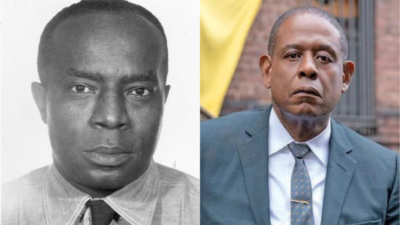 15 Gangsta Things About Bumpy Johnson, The Real Godfather of Harlem. By Noah A. McGee / The Root
15 Gangsta Things About Bumpy Johnson, The Real Godfather of Harlem. By Noah A. McGee / The Root
Thought it had to be made up? Here are some real and fascinating tidbits about Bumpy Johnson, who’s portrayed by Forest Whitaker in Godfather of Harlem.
Godfather of Harlem is an American crime drama that chronicles the true story of New York City crime boss Bumpy Johnson. Played by Academy Award-winning actor Forest Whitaker, fans are transported into the 1960s and learn about Johnson’s rise as a crime boss. Before you catch up on the latest season, here are some facts about the real-life Bumpy. Bumpy died in 1968, but his wife, Mayme Hatcher, whom he married in October 1948, lived until May 2009. A year before her death, she wrote a book titled Harlen Godfather: The Rap on My Husband, Ellsworth “Bumpy” Johnson, which inspired the story for Godfather of Harlem. First two seasons on Hulu. Third season on MGM. Read more
Sports
 Brittney Griner Will Return to W.N.B.A. By Jonathan Abrams / NYT
Brittney Griner Will Return to W.N.B.A. By Jonathan Abrams / NYT
Griner, who was released from a prison camp in Russia in December, signed a one-year contract with the Phoenix Mercury.
In an Instagram post after her release, Griner pledged to work to free other Americans who have been declared wrongfully detained and said she planned to play in the W.N.B.A. again. Griner last played in the W.N.B.A. in 2021, producing one of the best campaigns of her career, with averages of 20.5 points, 9.5 rebounds and 1.9 blocks. Phoenix opens its season against the Los Angeles Sparks on May 19. Read more
 How apartheid, European racism and Pelé helped cultivate a culture of diversity in US soccer that endures into the MLS. By John M. Sloop / The Conversation
How apartheid, European racism and Pelé helped cultivate a culture of diversity in US soccer that endures into the MLS. By John M. Sloop / The Conversation
North America’s most diverse professional league kicks off on Feb. 25, 2023, as Major League Soccer returns after a winter break.
The league, commonly known as the MLS, has long prided itself as a standard-bearer for racial and national diversity: Last season saw players from 82 countries across six continents compete for teams. Members of racial minorities make up 63% of players and 36% of head coaches, according to the latest diversity scorecard from the University of Central Florida’s Institute for Diversity and Ethics in Sport. Read more
 Where Are All the Black Women in Sports Journalism? By Angela Johnson / The Root
Where Are All the Black Women in Sports Journalism? By Angela Johnson / The Root
We spoke with Elaine Welteroth about her emotional conversation with sports journalists Cari Champion, MJ Acosta-Ruiz and Kelsey Nicole Nelson
During the weekend of February 11 and 12, most people were laser-focused on the Super Bowl (and Rihanna’s performance, of course). But while all of that was going on, CIROC was hosting an important conversation about Black women in sports journalism. “People were moved to tears. We saw each other in our stories. We connected and felt seen. It was like Black girl journalism church,” she said. “Whether we’re in fashion, sports, broadcasting, print or digital, we all understand what it means to be the first, the only, and to feel different,” she said. “It’s a very small niche, and we have to stick together.” Read more
Site Information
Articles appearing in the Digest are archived on our home page. And at the top of this page register your email to receive notification of new editions of Race Inquiry Digest.
Click here for earlier Digests. The site is searchable by name or topic. See “search” at the top of this page.
About Race Inquiry and Race Inquiry Digest. The Digest is published on Mondays and Thursdays.
Use the customized buttons below to share the Digest in an email, or post to your Facebook, Linkedin or Twitter accounts.